There are no weekends off on a polar research expedition. On Saturday we tied up to an ice floe that was several hundred meters wide for Ice Station #2 and today we tied up to a flow that was nearly a mile wide and 1.5 miles long. Most of the sea ice is about 3 feet thick with 2 feet of snow on top. Once the ship is secured to the flow with massive ropes and even more impressive stakes, the science teams walk down the gangplank to establish ice stations. For safety, each team has a radio and is in constant contact with the bridge. No one can go on or off the ice without alerting the officer in charge. Everyone is also required to wear the yellow and blue safety suits that make us easy to see and also make us float, just in case. It takes the teams about 4-5 hours to collect the ice and water samples and then they head into the labs to begin analysis. While all of this is happening, the physical oceanographers are busy lowering their CTD toward the bottom of the sea as it collects data and water samples along the way. This morning, the seal research team searched for miles on foot and in their inflatable Zodiac boat but could not find a seal. Then, as I worked on the bridge writing this journal, I spotted two crabeater seals leap from the water and move out onto our flow only a few hundred meters from the ship. I alerted the seal scientists (who were already tired) and they rushed off. Within an hour they had captured and release both seals and had collected valuable information about the health and disease susceptibility of these beautiful animals. The seal guys will sleep well tonight!
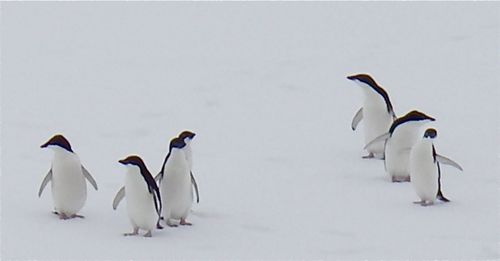 I have to keep reminding myself that this is not magic. Antarctica is so remote that these Adelie penguins have probably never seen a person before. And, with no reason to fear anything above the ice, they give into their curiosity and approach anything unusual on the ice floe . They checked out the people, the science equipment and even the ship itself.
I have to keep reminding myself that this is not magic. Antarctica is so remote that these Adelie penguins have probably never seen a person before. And, with no reason to fear anything above the ice, they give into their curiosity and approach anything unusual on the ice floe . They checked out the people, the science equipment and even the ship itself.
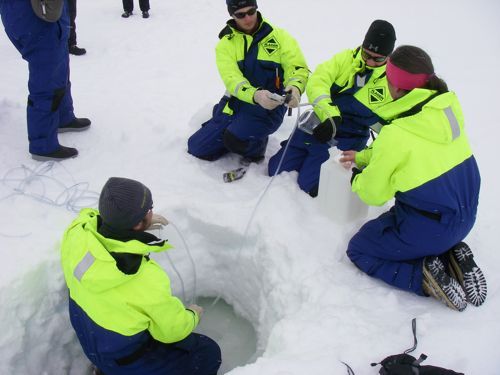 Dr. Yager holds the collection jug as students Kevin, Brett and Alex pump brine from a hole in the ice. This hole does not go all the way through the sea ice. Instead, it acts like a well and allows super saline water in the porous sea ice to flow through brine channels and collect in the hole. This brine is then brought into the labs aboard Oden and is tested for several things. All of the sea ice algae and bacteria actually live in this brine.
Dr. Yager holds the collection jug as students Kevin, Brett and Alex pump brine from a hole in the ice. This hole does not go all the way through the sea ice. Instead, it acts like a well and allows super saline water in the porous sea ice to flow through brine channels and collect in the hole. This brine is then brought into the labs aboard Oden and is tested for several things. All of the sea ice algae and bacteria actually live in this brine.
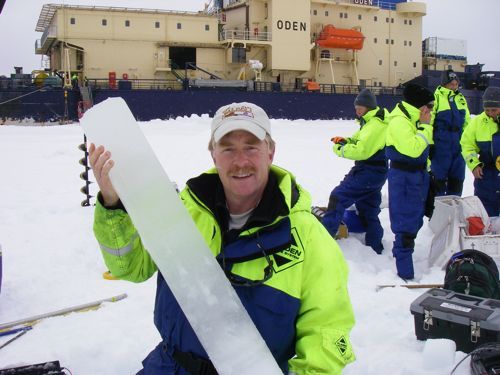 This 14 cm diameter sea ice core is 1 meter long but it is only the top part of a 2 meter core sample that was drilled from this ice floe. This part of the core is white because it did not contain the algae rich layer that the team was working to collect. You can see part of the Swedish Ice Research Team behind me. Both teams work together to plan and share the data collection.
This 14 cm diameter sea ice core is 1 meter long but it is only the top part of a 2 meter core sample that was drilled from this ice floe. This part of the core is white because it did not contain the algae rich layer that the team was working to collect. You can see part of the Swedish Ice Research Team behind me. Both teams work together to plan and share the data collection.
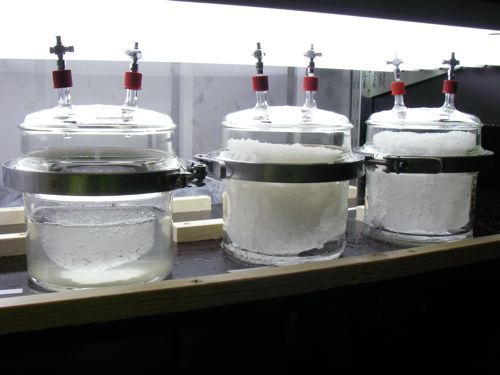 The Ice Team’s biggest question is what kinds of gases are given off to the atmosphere by the algae and bacteria living in the sea ice. Dr. Yager created the design for these custom glass chambers. A 10cm long piece of the 14cm diameter ice core is placed into the airtight chambers as soon as it is cut from the sea ice. The chambers are then placed under bright lights in a refrigerated lab so that the algae and bacteria continue to live and give off gases. The gases are then collected through the valves at the top of the chambers.
The Ice Team’s biggest question is what kinds of gases are given off to the atmosphere by the algae and bacteria living in the sea ice. Dr. Yager created the design for these custom glass chambers. A 10cm long piece of the 14cm diameter ice core is placed into the airtight chambers as soon as it is cut from the sea ice. The chambers are then placed under bright lights in a refrigerated lab so that the algae and bacteria continue to live and give off gases. The gases are then collected through the valves at the top of the chambers.
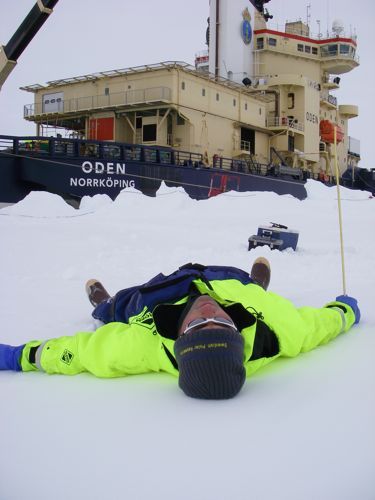 Kevin is the ice core specialist on the team and he directs the sampling on the ice floe. He also shovels the snow and runs the ice-coring machine for at least 10 cores each day. When all the samples are collected, Kevin deserves a rest.
Kevin is the ice core specialist on the team and he directs the sampling on the ice floe. He also shovels the snow and runs the ice-coring machine for at least 10 cores each day. When all the samples are collected, Kevin deserves a rest.
Flags of the Day
The following members of "Team Oden" created the flags below:
Mrs. Cousineau, 4th Gr. Solvay, NY.JPG Mrs. Calderwood's 3rd Gr, Soule Road Elem, Liverpool, NY Ally Germinara, age 5, Auburn, NY Cassady Konu & Brigid Lawless, Camp Talooli, Pennellville, NY Phoenix HS Drama Club, Phoenix, NY Ms. Figura's 5th Gr, Long Branch Elem, Liverpool, NY Mrs. Resseguie's Class, Soule Road Middle Sch, Liverpool, NY Syracuse Univ Bands and Kappa Kappa Psi Mr. Peneston's Block 1AC Earth Science class, Liverpool HS Mrs. Barnell's 9th Gr Earth Sci class, Liverpool HS, Liverpool, NY Ms. Fix's Art Club, Chestnus Hill Elem, Liverpool, NY Ms. Bushnoe's 3rd Gr, Liverpool Elem, Liverpool, NY Mrs. Kires 6th Gr, Nate Perry Elem, Liverpool, NY
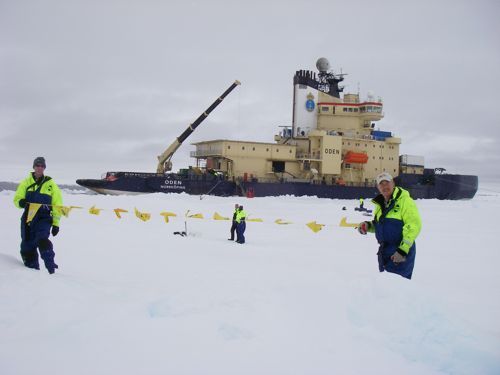 The Oden’s doctor helped me to fly today’s flags on a breezy ridge of ice.
The Oden’s doctor helped me to fly today’s flags on a breezy ridge of ice.
Photo of the Day!
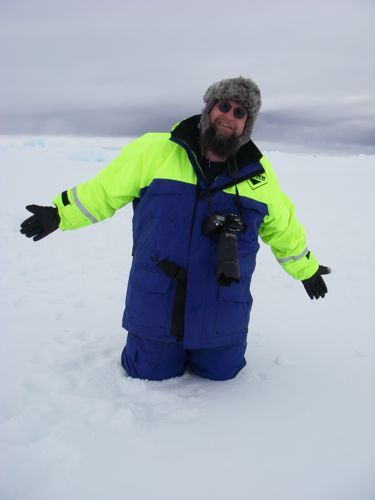 Dr. Henrik Kylin is the scientist from Sweden with the most experience working aboard the Oden. He is also the most knowledgeable about the birds and animals of the Antarctic. When he and I spotted a group of Adelie penguins coming toward the ship, we went out and sat down on the ice to wait. The group of penguins approached within 10 feet of us and they seemed particularly interested when Henrik was on his knees in his best penguin pose. I took the Photo below as we sat on the ice floe.
Dr. Henrik Kylin is the scientist from Sweden with the most experience working aboard the Oden. He is also the most knowledgeable about the birds and animals of the Antarctic. When he and I spotted a group of Adelie penguins coming toward the ship, we went out and sat down on the ice to wait. The group of penguins approached within 10 feet of us and they seemed particularly interested when Henrik was on his knees in his best penguin pose. I took the Photo below as we sat on the ice floe.
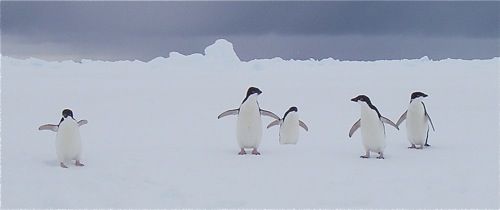 I took this photo while sitting on the floe by the ice coring station. I did not need a zoom lens and I only took this one photo. Then I put the camera down and I marveled at these amazing birds with my own eyes until they decided they had satisfied their curiosity and walked away.
I took this photo while sitting on the floe by the ice coring station. I did not need a zoom lens and I only took this one photo. Then I put the camera down and I marveled at these amazing birds with my own eyes until they decided they had satisfied their curiosity and walked away.
A Reminder,
Be sure to go to the Live From IPY section and register to participate in our first live webinar from the Oden that will take place this Tomorrow! It will start on Monday at 12:30 East Coast time.
A Gift,
As a teacher and camp program director who has participated in many Live from IPY web conferences, I have created a document for teachers and others who are planning to participate with their classes on Monday. It is a series of tips and suggestions for how to prepare yourself, your students and your equipment. The document is attached to the bottom of this journal post.
Take care, have fun & make memories,
Jeff Peneston

